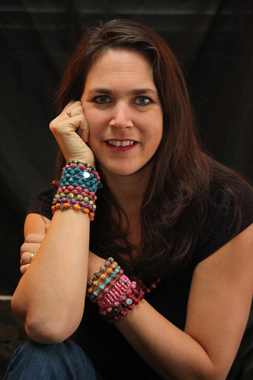Campus News
Alumni Profile: 1995: Devin Hibbard: Beads and blessings
When Devin Hibbard saw a woman named Millie sitting on her front stoop in the slums of Uganda rolling trash paper into tight little beads, she just had to know her story.

Devin Hibbard was walking through the slums of Uganda when she saw a woman named Millie sitting on her front stoop rolling trash paper into tight little beads.
At the time, Hibbard (College Eight ’95, community studies) had already been exposed to crushing poverty. She’d spent time in the field in India as part of her undergraduate thesis helping women in poverty. When she saw Millie’s resourcefulness, she just had to learn her story.
Hibbard discovered that Millie had fled to the slums during the civil war. The only way to make any significant money in the city was to use dynamite to blow up rock in a quarry, then break up the pieces by hand, using hammers and other tools.
“She and all her children worked in the quarry,” said Hibbard. Millie made the beads in hopes of making a little extra money for her family, as did other women in the slum.
Hibbard bought a few necklaces and began wearing them around town, where their inventive and flashy designs got noticed right away. Before she and her mother left Uganda they bought a necklace from each of the 100 women who lived in mud homes in the slum.
“We didn’t have any experience selling products,” Hibbard said. “We just wanted to create some economic activity.”
After returning home to the U.S., Hibbard hosted an event at home to try and sell the beads. It was so popular that Hibbard decided to move back to Uganda to form Bead for Life, an international nonprofit organization that helps women lift themselves out of poverty by becoming self-sustaining entrepreneurs.
“My experience at UC Santa Cruz, and specifically with community studies, was formative in creating my desire to do work that matters and makes the world a better place,” said Hibbard.
Women enrolled in the Bead for Life program commit to an 18-month training program where they learn bead-making as well as entrepreneurial skills and business savvy.
Bead for Life has grown exponentially during its 10-year existence so far. It got a big boost in November 2004, when O magazine ran a 250-word article about the organization, and helped transform it into a phenomenon.
“We sold $90,000 worth of beads in six weeks,” Hibbard said. These days, Bead for Life sells about $2 million worth of jewelry and other items per year.
Hibbard marvels at the impact the organization has had on Millie’s neighborhood.
“It has transformed the community,” said Hibbard. Children who weren’t being fed three times a day now have access to healthy meals, and 98 percent of the children of women enrolled in the program are in school.
The nonprofit has reached more than 40,000 people in Uganda. Women have started 2,290 micro-businesses as a result of the Bead for Life training, which offers more than just business know-how. It also encourages these women to have a greater sense of themselves and realize that a life outside of extreme poverty is within their grasp.
“We help poor women become self-sustaining entrepreneurs,” said Hibbard. “Access to money is not the biggest barrier. Access to confidence is.”
The group’s success has inspired others to follow suit. Now 100 other nonprofit groups and for-profit businesses are selling beads made of recycled paper in Uganda and around the world.
“We really created a cottage industry,” Hibbard said.
This fall, Bead for Life is launching a global initiative. “Our goal is to reach 1 million women around the world,” said Hibbard.
Meanwhile Hibbard continues to travel worldwide so she can get a close-up view of the potentials and struggles of communities across the globe.
She met her husband, Mark Jordahl (Stevenson ’93, Chinese religious studies), while they were enrolled at UC Santa Cruz. The pair is committed to spending time outside of the United States and exposing their two sons to the wider world.
“My 8-year-old lived about half of his life in Uganda and is constantly lobbying to move back,” laughed Hibbard.
“If you don’t get out,” she continued, “you have no perspective of life in the U.S.”